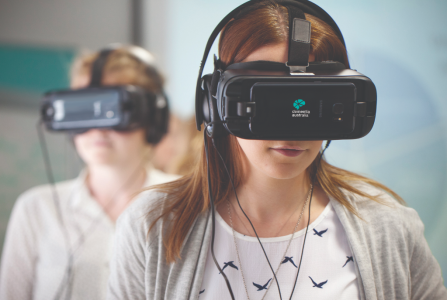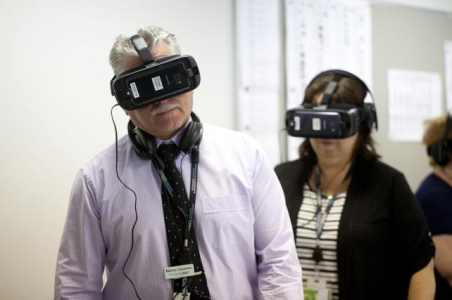Discover the innovative technology that is transforming dementia care
We often use words like 'amazing' and 'awesome' to describe new and modern technological inventions, but nothing has impressed us quite like the incredible virtual reality (VR) technology currently being deployed to help improve the quality of life for those living with dementia.
102-year-old Sally Banyard is one example. After a bad fall and injury a few years ago, Sally was sadly diagnosed with dementia and has since been living in a residential aged-care facility called Goodwin Aged Care Services.
Her stepdaughter-in-law Marion Banyard—a retired registered nurse—said that it can be difficult to properly care for someone with dementia as their individual needs are highly varied.
‘It is very hard to understand what people with dementia are going through and how to cope with it,’ Banyard said.
‘It is imperative that there are different ways to experience and understand what your loved one is going through.’.
The good news is that advanced VR tools like the Educational Dementia Immersive Experience (EDIE) are changing the game.
Goodwin Aged Care Services is carrying out this vital training, which is part of a partnership with Dementia Australia.
Sarah Lewis, the Executive Manager of the aged care centre, believes it is essential for staff to know the triggers faced by those living with dementia.
'One size doesn't fit all with dementia, the behaviours can vary. We can have anything from verbal refusal of care, through to wandering, to physical aggression,' she explained, citing the need for specialised approaches.
Karen Cmiel, a facilitator at Dementia Australia, explains the concept behind EDIE: 'The learner using the virtual technology, using those headsets, actually goes into the world of the person living with dementia for about 15 to 20 minutes.'
The landscape is designed to mimic the symptoms and perceptions someone living with dementia may experience.
Participants will play the role of a character—aptly named Edie—in the first scenario. They are tasked with navigating from a bedroom to the bathroom at night.
This is a regular everyday event, but it is complicated by a narrower field of view, patterned wallpaper and carpet that appear to move, and mysterious and loud noises (which are actually common triggers for those living with dementia).
Because of the disorientation and confusion these elements cause, Edie will urinate in a laundry basket instead of the bathroom.
‘All these things can be quite frightening,’ Ms Cmiel claimed.
This experience highlights how these sensory challenges can confuse someone with dementia.
‘Making people feel uncomfortable is how we inform change and how we get staff really understanding and onboard,’ Ms Lewis shared.
Elina Shrestha, Goodwin's Deputy Director of Nursing, agreed that the EDIE training has helped create greater empathy and insight into creating more dementia-friendly environments.
'It gave me a whole different perspective of how residents are living with dementia. You might see me this way today, but when I have dementia, I might be a different person tomorrow. It totally changes their personality because their perception has totally changed,' she pointed out.
The second virtual reality scenario featured a more dementia-friendly environment. Clutter and decorative patterns were removed. Meanwhile, contrasting colours, written labels, and better lighting were added to more clearly define spaces and help the person safely navigate the home.
Little details like this can make a difference for those with the condition, and that's what EDIE training is all about.
Karen believes this program also gives people living with dementia and their loved ones a better understanding of the condition: 'I love seeing change... I am very passionate about seeing that translation of the information we provide to actually making a difference.'
Banyard perfectly sums up the impact this virtual reality technology initiative has had on her outlook: 'It is a great way to go. It gives a lot more insight into how a person with dementia navigates their way around their daily activities.'
Incredible initiatives like these make us hopeful for the future of dementia care, and remind us of the importance of investing more in research and development in this field.
Currently, more than 400,000 Australians are living with dementia; that is why Dementia Australia is continuing to lobby the federal government to increase funding for all dementia care education so that more people can learn how to better help those living with this condition.
You can watch a demonstration of EDIE here:

What do you think of this story, members? Share your thoughts in the comments below!
102-year-old Sally Banyard is one example. After a bad fall and injury a few years ago, Sally was sadly diagnosed with dementia and has since been living in a residential aged-care facility called Goodwin Aged Care Services.
Her stepdaughter-in-law Marion Banyard—a retired registered nurse—said that it can be difficult to properly care for someone with dementia as their individual needs are highly varied.
‘It is very hard to understand what people with dementia are going through and how to cope with it,’ Banyard said.
‘It is imperative that there are different ways to experience and understand what your loved one is going through.’.
The good news is that advanced VR tools like the Educational Dementia Immersive Experience (EDIE) are changing the game.
Goodwin Aged Care Services is carrying out this vital training, which is part of a partnership with Dementia Australia.
Sarah Lewis, the Executive Manager of the aged care centre, believes it is essential for staff to know the triggers faced by those living with dementia.
'One size doesn't fit all with dementia, the behaviours can vary. We can have anything from verbal refusal of care, through to wandering, to physical aggression,' she explained, citing the need for specialised approaches.
Karen Cmiel, a facilitator at Dementia Australia, explains the concept behind EDIE: 'The learner using the virtual technology, using those headsets, actually goes into the world of the person living with dementia for about 15 to 20 minutes.'
The landscape is designed to mimic the symptoms and perceptions someone living with dementia may experience.
Participants will play the role of a character—aptly named Edie—in the first scenario. They are tasked with navigating from a bedroom to the bathroom at night.
This is a regular everyday event, but it is complicated by a narrower field of view, patterned wallpaper and carpet that appear to move, and mysterious and loud noises (which are actually common triggers for those living with dementia).
Because of the disorientation and confusion these elements cause, Edie will urinate in a laundry basket instead of the bathroom.
‘All these things can be quite frightening,’ Ms Cmiel claimed.
This experience highlights how these sensory challenges can confuse someone with dementia.
‘Making people feel uncomfortable is how we inform change and how we get staff really understanding and onboard,’ Ms Lewis shared.
Elina Shrestha, Goodwin's Deputy Director of Nursing, agreed that the EDIE training has helped create greater empathy and insight into creating more dementia-friendly environments.
'It gave me a whole different perspective of how residents are living with dementia. You might see me this way today, but when I have dementia, I might be a different person tomorrow. It totally changes their personality because their perception has totally changed,' she pointed out.
The second virtual reality scenario featured a more dementia-friendly environment. Clutter and decorative patterns were removed. Meanwhile, contrasting colours, written labels, and better lighting were added to more clearly define spaces and help the person safely navigate the home.
Little details like this can make a difference for those with the condition, and that's what EDIE training is all about.
Karen believes this program also gives people living with dementia and their loved ones a better understanding of the condition: 'I love seeing change... I am very passionate about seeing that translation of the information we provide to actually making a difference.'
Banyard perfectly sums up the impact this virtual reality technology initiative has had on her outlook: 'It is a great way to go. It gives a lot more insight into how a person with dementia navigates their way around their daily activities.'
Incredible initiatives like these make us hopeful for the future of dementia care, and remind us of the importance of investing more in research and development in this field.
Currently, more than 400,000 Australians are living with dementia; that is why Dementia Australia is continuing to lobby the federal government to increase funding for all dementia care education so that more people can learn how to better help those living with this condition.
You can watch a demonstration of EDIE here:
Key Takeaways
- Goodwin Aged Care Services is using virtual reality technology to improve care for individuals with dementia.
- The tool, developed in partnership with Dementia Australia, is called the Educational Dementia Immersive Experience (EDIE) and helps carers understand the experiences of those living with dementia.
- By replicating experiences like moving objects and difficulty with colour differentiation, the tool creates empathy and helps staff create more dementia-friendly environments.
- Dementia Australia advocates for increased funding for dementia care education, including technology-enhanced training like the EDIE tool.
What do you think of this story, members? Share your thoughts in the comments below!









